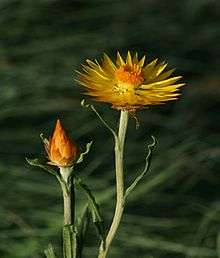Xerochrysum subundulatum
| Xerochrysum subundulatum | |
|---|---|
 | |
| Scientific classification | |
| Kingdom: | Plantae |
| (unranked): | Angiosperms |
| (unranked): | Eudicots |
| (unranked): | Asterids |
| Order: | Asterales |
| Family: | Asteraceae |
| Genus: | Xerochrysum |
| Species: | X. subundulatum |
| Binomial name | |
| Xerochrysum subundulatum (Sch.Bip.) R.J.Bayer[1] | |
| Synonyms | |
|
Gnaphalium subundulatum (Sch.Bip.)[2] | |

Xerochrysum subundulatum (commonly named the Alpine Everlasting or Orange Everlasting) is a flowering plant in the family Asteraceae, native to Australia, growing in Victoria, New South Wales and Tasmania.[8]
It is an ascending or erect annual. The plant normally grows to about 60 cm in height, and is usually simple or few-branched. Inflorescence bracts are papery and golden-yellow in colour.[8] It has thin, fleshy roots with a mean maximum diameter of 2mm.[9]
Seedlings are tolerant of existing adult competition.[10] Its post-fire regenerative strategy is by both seed and sprout.[9]
References
- ↑ Bayer, Randall J. (2001). "Xerochrysum Tzvelev, a Pre-Existing Generic Name for Bracteantha Anderb. & Haegi (Asteraceae: Gnaphalieae)". Kew Bulletin. 56: 1013–1015. doi:10.2307/4119317. JSTOR 4119317.
- ↑ Bot. Zeitung (Berlin) 3: 171 (1845).
- ↑ Paul G. Wilson, Muelleria 7 (4): 519 (1992).
- ↑ Prodr. 6: 188 (1838)
- ↑ Opera Bot., 104: 105 (1991)
- ↑ Enum. Hort. Berol. Alt. 2: 317 (1822). Type: "in Pr. b. sp."
- ↑ Hort. Brit. 223 (1826).
- 1 2 PlantNET: Xerochrysum subundulatum
- 1 2 Tolsma, A. D.; Read, S. M.; Tolhurst, K. G. (2007). "Roots of Australian alpine plant species contain high levels of stored carbohydrates independent of post-fire regeneration strategy". Australian Journal of Botany. 55 (8): 771. doi:10.1071/BT06216.
- ↑ Maria Taranto, Judy Downe, Fiona Coates and Alison Oates (2004). "Recovery of montane swamp complex after bushfires in north east Victoria 2003" (PDF). Arthur Rylah Institute Technical Report. 152.